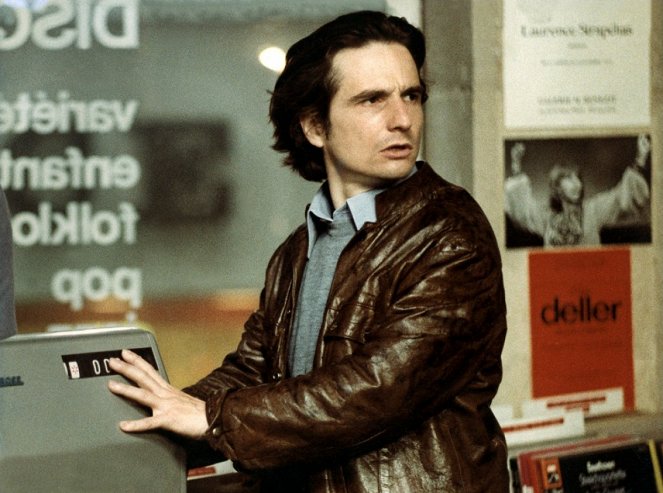Directed by:
François TruffautCinematography:
Néstor AlmendrosComposer:
Georges DelerueCast:
Jean-Pierre Léaud, Claude Jade, Marie-France Pisier, Dorothée, Dani, Daniel Mesguich, Julien Bertheau, Anne Kreis, Jean-Pierre Ducos, André Dussollier (more)VOD (1)
Plots(1)
François Truffaut's LOVE ON THE RUN finds the director's alter ego, Antoine Doinel (Jean-Pierre Léaud), in his mid-30s. Relatively content with his young, beautiful lover, Sabine (Dorothée), Antoine still runs from woman to woman, looking to fill the gap in his life--a void that exists because of his inability to commit in relationships and because of his mother's recent death. As Antoine gains self-awareness, slowly comprehending the reasons for his emptiness, he reflects back on his various relationships. These experiences are related in part through black-and-white flashbacks dictated by the pages of his semiautobiographical book, LES SALADES DE L'AMOUR, and also in his current life as Antoine actively seeks out people and places from his past and attempts to reinvent them in the present. This process involves his first love, Collette (Marie-France Pisier); his second love, Christine (Claude Jade), who eventually became his wife and birthed his son, Alfonse; and his wife's violin student, Liliane (Dani). (official distributor synopsis)
(more)Reviews (3)
If someone doesn't have the time or desire to watch the entire cycle of François Truffaut's films dedicated to his favorite protagonist Antoine Doinel, they can watch Love on the Run and get acquainted with the plot of the previous films in a nutshell, because a significant part of this film consists of flashbacks. Those who have seen Truffaut's previous films know what the film will be about and what they can expect. Doinel can't seem to grow up and choose a partner and his place in life. After previous failed relationships, another relationship collapses for him and Doinel longs to return to his previous loves and memories. Doinel is simply all about indecisiveness and uncertainty, but Truffaut gives him another chance to start afresh. A decent and humorously light-hearted Truffaut film. Overall impression: 80%.
()
The loose pentalogy of movies about the life and times of Antoine Doinel ends when he reaches the age of thirty and divorces the charming Christine. Especially the first hour is a recap of Antoine’s life using flashback memories comprising excerpts from the preceding four pictures, which wouldn’t matter if it was just a couple of them helping to create the atmosphere where the main protagonist is going though a middle-age crisis. But there are tons of them (about sixty, in fact) and they are arranged in such a way that I started to wonder whether such a haywire movie could really have been made by such a genius of a director like Truffaut. This part looks as if it were aimed at an audience that is completely unaware of the parts that preceded it. Luckily, by the time we get to the closing section, everything has been recapped and so the classic, emotionally powerful, typically Truffaut section can begin. This becomes a movie deserving a full set of stars as of the scene with the conversation between Colette and Christine on the bench. And the very end is awesome. So, farewell Antoine and I hope that you live out your life well, even without an audience...
()
Unrepentant dreamer at the end of his film journey. Truffaut had only a few shots and years left, but another chapter would not come, because it was not needed. Love on the run returns to all previous parts, giving surprisingly equal attention to Christine and Colette and providing everyone involved with the desired resolution. He does so using overused flashbacks, but in doing so he also connects situations that are almost incompatible, and the feeling of catharsis of the main troublemaker is absolute. Although Antoine Doinel, the central romantic anti-hero, continues to make the same mistakes, he believes that with the next / previous one it could finally be the right one, in the last minutes you can't wish him anything else but for it to work out. So that happiness lasts not just a few minutes, but possibly a whole life. The feeling that knocks you to the wall is just as intoxicating at thirteen as it is at thirty, but when a person is lucky, the cause is always something different.
()


Ads